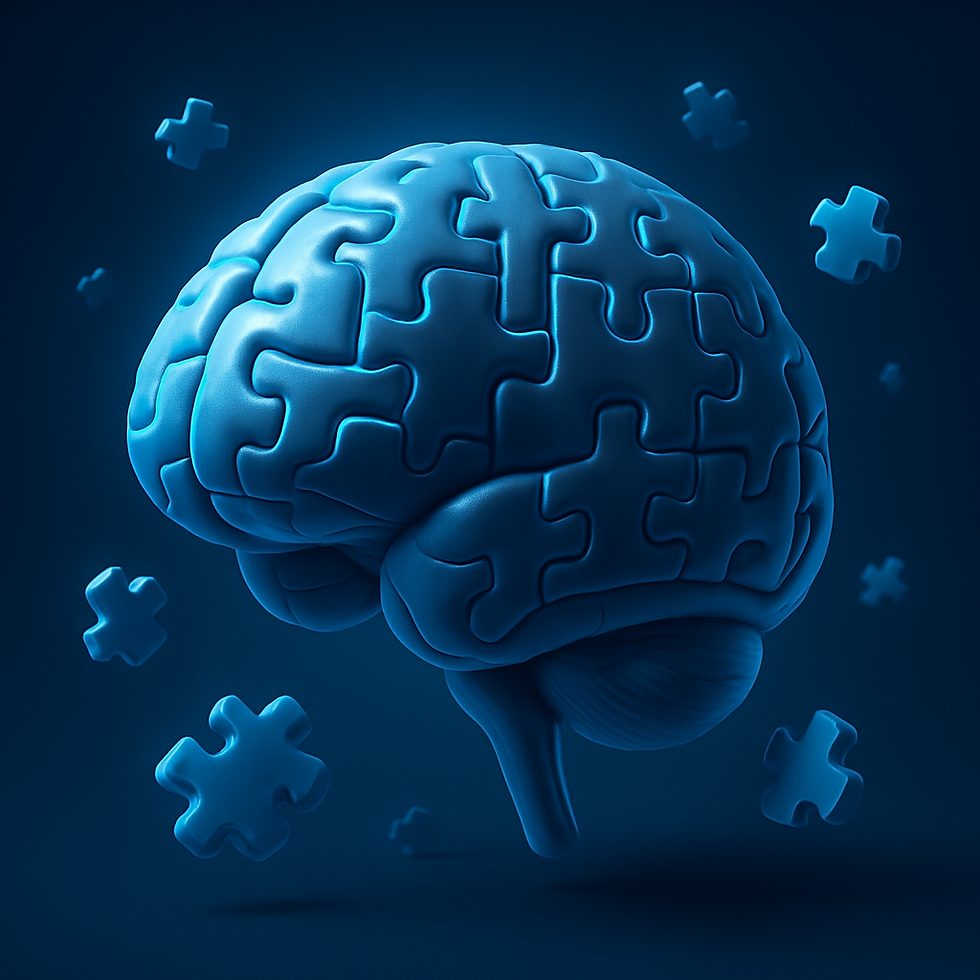The Top Nutrient Deficiencies in Autism and Why They Matter
- Kenneth Anshewitz
- May 22
- 3 min read
Back at the start of 2023, something felt off. I couldn’t tell if I was dealing with the slow creep of aging or if it was the cumulative effect of years of inconsistent diet and exercise. My gut had always been a mystery: discomfort, inflammation, and unpredictability was persistent. For a long time, I brushed it off. Health regimens felt like scams—endless supplement stacks sold by people chasing profit.

Then I came across Blueprint by Bryan Johnson. It was the first health protocol I’d seen that was grounded in data—epigenetic clocks, extensive biomarker tracking, brain imaging, and the most comprehensive supplement stack I've ever seen. Even though he goes over the top on social media, this protocol wasn't just hype. It was a system built to reverse biological aging, and it challenged everything I thought humans knew about health.
Later that same year, I dove into autism research after a friend was poking fun at my tendencies and autism went viral online. And ironically, the deeper I got into both health optimization and autism studies, the more overlap I saw—especially in how nutrition, metabolism, and the gut impact neurological function. What began as a journey to improve my own health revealed a web of nutrient deficiencies that are frequently observed in individuals with autism.
🧠 Top Nutrient Deficiencies in Autism
These aren’t universal—but they show up often in peer-reviewed literature, lab data, and clinical practice. Whether driven by restrictive diets, gut issues, or metabolic dysfunction, these deficiencies can worsen symptoms, impair development, and alter gene expression long-term.
1. Iron
Why it matters: Supports dopamine regulation, myelination, and mitochondrial function.
Why it's low: Selective eating, chronic gut inflammation, or malabsorption.
Impact: Fatigue, attention issues, developmental delays.
Low ferritin is common in autistic children and may impact executive functioning.
2. NAD+ / Niacin (Vitamin B3)
Why it matters: Fuels mitochondrial respiration and cellular repair.
Why it's low: Poor conversion from tryptophan, inflammation, or limited dietary intake.
Impact: Redox imbalance, neuroinflammation, and energy deficits.
Low NAD+ is increasingly implicated in neurological disorders and aging—Blueprint includes NMN to address this directly.
3. Vitamin D
Why it matters: Modulates immunity, serotonin production, and gene expression.
Why it's low: Indoor lifestyles, sunscreen use, low-fat diets, or genetic differences.
Impact: Poor mood regulation, immune dysfunction, altered calcium signaling.
25(OH)D levels are commonly low in ASD, and deficiency is linked to behavioral issues and immune dysregulation.
4. Folate / Methylfolate (Vitamin B9)
Why it matters: Essential for DNA methylation and neurotransmitter synthesis.
Why it's low: MTHFR mutations or insufficient intake of leafy greens and legumes.
Impact: Epigenetic dysregulation, oxidative stress, impaired detoxification.
L-methylfolate crosses the blood-brain barrier and is critical for neurodevelopment.
5. Vitamin B12 (Methylcobalamin)
Why it matters: Partners with folate in methylation and myelination.
Why it's low: Gut issues, vegan diets, or poor absorption.
Impact: Elevated homocysteine, poor detox, reduced cognitive performance.
Subcutaneous methyl-B12 injections are sometimes used in biomedical autism protocols.
6. Zinc
Why it matters: Key for immune balance, synapse formation, and GABA function.
Why it's low: Poor absorption, excess copper, picky eating.
Impact: Anxiety, hyperactivity, and immune dysfunction.
Low zinc-to-copper ratios have been flagged as a biomarker in multiple ASD studies.
7. Magnesium
Why it matters: A cofactor in 300+ enzymatic reactions. Helps regulate stress and sleep.
Why it's low: Diets low in nuts/seeds, GI loss, or metabolic dysfunction.
Impact: Anxiety, poor focus, irritability, constipation.
Magnesium threonate crosses the blood-brain barrier and may help with cognitive issues.
8. Omega-3 Fatty Acids (EPA/DHA)
Why it matters: Supports synaptic plasticity, brain connectivity, and inflammation resolution.
Why it's low: Vegan diets, processed food intake, poor conversion from ALA.
Impact: Mood issues, language delays, increased inflammation.
Multiple trials show moderate benefit in language and attention outcomes with supplementation.
🧫 Gut-Brain Axis and Dysbiosis
Gut health is a recurring theme in autism research. Many individuals show:
Low beneficial bacteria like Bifidobacterium and Lactobacillus
Overgrowth of Clostridia, Candida, or pathobionts
Elevated byproducts like propionic acid—linked to behavioral regression in rat models
This microbial imbalance can lead to:
Leaky gut
Immune overactivation
Altered neurotransmitter production
Impaired detoxification
🔄 Can These Impact Gene Expression?
Long-term nutrient imbalances don’t just affect behavior—they alter biology at the cellular level:
Methylation cycle disruption from low B12, folate, and choline affects DNA expression.
Mitochondrial dysfunction from NAD+, CoQ10, and carnitine deficits alters cell energy, apoptosis, and neurodevelopment.
Chronic inflammation from gut issues or immune dysregulation interferes with neural pruning, emotional regulation, and hormone balance.
📌 Final Take
Let’s be clear: nutrient deficiencies don’t cause autism. But they can absolutely exacerbate symptoms, derail progress, and deepen developmental challenges—especially when combined with genetic predispositions and environmental stressors.
Whether it's due to food selectivity, microbiome imbalances, or metabolic idiosyncrasies, many autistic individuals are biologically under-supported. And if we’re serious about helping them thrive, we have to get serious about restoring what’s missing—starting with the basics.




Comments